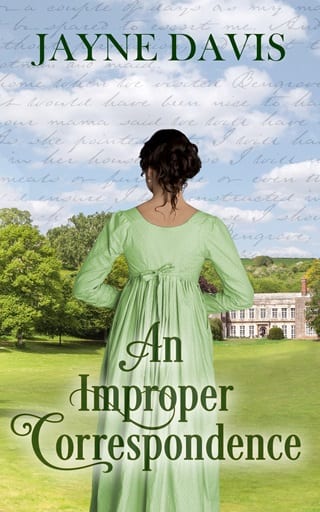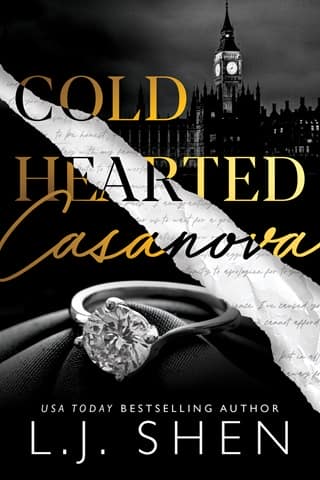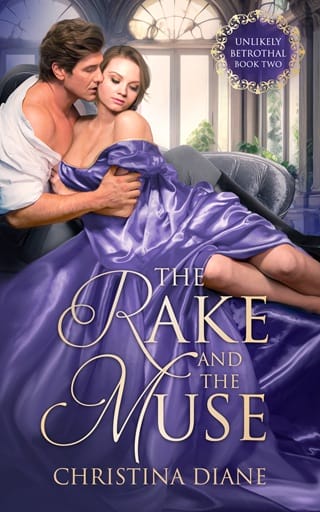Chapter 16
CHAPTER 16
T he man who entered the library was about Rob's own height, with clear blue eyes and hair that was going grey but not yet thinning. He was alone.
"Mr Stretton. Thank you for seeing me." Rob made a bow, ignoring his disappointment at Miss Stretton's absence.
Mr Stretton inclined his head with a welcoming smile. "Captain Delafield. Won't you sit down?" He waved towards the chairs. "What can I do for you?"
Rob set his parcel down on a table beside his chair and rested his stick against it. "I… er…" He swallowed, and cravenly decided to start with the least contentious part. "Monsieur Allard, of the Banque de la Meuse in Verdun, asked to be recommended to you, as desirous of maintaining good relations now that peace is with us."
"Thank you for passing that on. Monsieur Allard has been most helpful, it seems."
"He has, yes. I also wished to thank you for sending books and news."
"You should rather thank my daughter." There was a dry note to his voice.
"I would be glad to, if you permit. "
Mr Stretton did not reply immediately, and Rob had to stop himself squirming under his host's scrutiny. Corresponding with another man's betrothed might not have been an honourable thing to do, but her father had known about it. Or, rather, he had found out and allowed it to continue. He could not have disapproved completely.
"Before I answer that, Captain, tell me something about yourself."
"Captain Robert Delafield, 2nd battalion, 30th Foot," he started. Mr Stretton smiled and raised one brow. "Er, I expect you knew that already, sir."
"Why do you say that?"
Rob took a deep breath. "You allowed your daughter to conduct what many—most—people would regard as an improper correspondence. I assume you would have carried out some kind of check on who or what I was."
"You are correct. Were you also aware that I have read some of your letters?"
Rob felt his face get warm as he hastily tried to think of anything improper he might have written—particularly in the last few months, since their correspondence had begun to be more frank and open.
"When your brother wrote with a bank draft to repay me for the first few books that Jo sent," Mr Stretton continued, "I asked her to show me the letters you had exchanged to that point."
He'd never written anything that he could not have said to his sisters, he was sure, but he still felt some relief that no-one else had read the most recent ones.
"Why did you continue the correspondence, Captain? I am aware of the reason for your first letter, but after that?"
He'd expected to be asked something like this. "Miss Stretton replied and asked if there was anything she could do or send. As there was, I asked for books and news. It grew from that. Miss Stretton seemed happy to confide some of her thoughts to me."
Mr Stretton nodded, his face more serious. "And you to her. Captain, I can never thank you enough for conveying your speculation about the overuse of opium. Without that, we might never have realised that the physician my wife trusted was slowly poisoning her." His lips thinned and his brows drew together momentarily. "It still makes me angry to think of the harm…" He ran a hand through his hair.
"I am glad to have been of use, sir."
"Tell me more about yourself, Captain. You must have had other correspondents while you were in Verdun. I believe you have a large family?"
"Two brothers and four sisters."
"With you the youngest of the family."
It was a statement, not a question; Rob gave a wry smile. "You have been checking up on me." Mr Stretton chuckled, and Rob began to relax. This conversation still felt rather like an interrogation, but a friendly one. "Yes, I am the youngest. I had plenty of letters from them, but almost all about their families. Miss Stretton's letters were different—more wide-ranging, and recently more on how things go on in England. And… well, my sisters are all quite happy doing the usual female things. I mean, the things that society decrees are suitable for women. It was a novel idea for me that not all women thought like that."
"You approve?"
"It is not up to me, sir, to approve of your daughter, or to not approve."
"Hmm." There was a short pause before Mr Stretton went on. "Are you remaining in Town, Captain?"
Rob was relieved at the change of subject. "I'm not sure yet, sir. I need to go to Horse Guards, where I expect I'll be given leave." And after that? Campbell hadn't held out much hope of his ankle ever working properly again. It was possible that Horse Guards might still find a use for him, but it wasn't really likely. Although he should at least wait to find that out for certain before getting too worried about it. "I also need to go into Somerset."
"You have family there?"
"No, most of them live in Gloucestershire. My landlady's son has been held in Somerset since being taken prisoner, and I promised to ensure he had sufficient funds to return home safely. I will go on from there to see my family."
"Did you manage to see your men before you left France?"
Rob frowned. He didn't recall writing to Miss Stretton about that. "Sir?"
"Lieutenant Moorven called on me and explained why you had been delayed."
That was odd; Rob hadn't asked Moorven to do that. "Yes, I did. They seem to have been treated reasonably well." That reminded him of another part of his errand here. "I loaned them—gave them, rather—some money to ease their journeys. Sir, if I send you a draft on my bank, could you arrange to forward the money to Monsieur Allard? He was kind enough to advance me some extra funds."
"With no collateral?"
"He took my word," Rob said stiffly. "We had several discussions about the progress of the war. He did know me a little."
"I meant no offence, Captain, I assure you. Do send the draft when you have it, and call again when you are back in London." Rob's expression must have looked doubtful. "I mean that, Captain. Apart from anything else, my daughter is not at home at the moment. I assume you wish to thank her in person?"
"Er, yes. Thank you, sir." He would be allowed to talk to her, then. That was good, albeit somewhat unwise. Although Mr Stretton's words had been a clear signal that the interview was at an end, Rob did not stand up. There was still the matter of Bengrove.
"Is that all, Captain?"
Rob took a deep breath. "No. Sir, you may consider this not to be my concern, but I must say something about Captain Bengrove. He—" Rob stopped as Mr Stretton held up a hand.
"Please say no more, Captain. No, don't look so worried. I should tell you that Lieutenant Moorven had quite a bit to tell me about Captain Bengrove, so there is no need for you to repeat it. Unless you know anything he does not?"
"Er, possibly different details, but I imagine our opinions of him are very similar. "
"Very well. Thank you for your concern for my daughter, Captain, and be assured that I have her best interests at heart."
Rob wasn't quite sure what that meant, but he had quite clearly been dismissed. He stood, picked up his parcel, and took his leave. Horse Guards next, although he doubted he'd get any answers right away. He'd be lucky to achieve anything more than getting an appointment. Then to a coaching office to find out how best to get to Cheringford to see Madame's son.
A carriage turned into the square as he was leaving it. It began to slow as it passed him, and when the noise of hooves and wheels ceased, he looked back. The carriage stood outside the house he had just left, with a footman letting down the step. Was this Miss Stretton returning?
The first person out was a young man, who handed down the other occupants; an older woman, possibly in her forties, dressed in emerald green, then two younger women, one in a lilac pelisse, the other in dark red. He couldn't make out their features from this distance, but neither matched his mental image of Miss Stretton, so he turned and walked on.
Then it occurred to him that his idea of Miss Stretton's appearance was based solely on what Bengrove had said of her, and was not to be trusted. He spun around again, but the party had already gone into the house. Damn!
He contemplated going back. But if Miss Stretton were not one of the young women, what possible excuse did he have for returning so soon? No, he would have to wait until he after his visit to his family.
"Oh, look, Jo—is that Alfred back at last?" Cousin Lydia said excitedly, pointing out of the window of the carriage. "You've just missed him!"
Jo had been looking the other way, and did not see who Lydia was pointing at, but George stuck his head out of the window and glanced backwards.
"No, that's not a cavalry uniform."
"How can you tell from this distance?" Lydia asked .
"Headgear," said her brother with an air of superiority. "That chap was wearing an infantry shako."
"Oh," Lydia said, her interest waning as Jo's intensified.
If it weren't Alfred, could it have been Captain Delafield? However, there were any number of reasons why an infantryman could be in Russell Square; he might not even be an officer.
"Oh, that's a shame," said Aunt Sarah. "I wonder what's keeping him away. You haven't heard from him recently, have you Jo?"
"No, Aunt." At that moment the coach came to a halt, and they gathered their purchases while the door was opened. George handed them down, and Jo paused to glance up the street, but all she saw was a man in a red coat as the soldier walked away.
"Come on, Jo, why are you dawdling there?" Aunt Sarah sounded impatient.
"Coming, Aunt."
George took his leave to walk home, but Aunt Sarah and Lydia followed Jo into Mama's parlour. They were describing the new walking dresses and evening gowns they had ordered when Papa joined them, a note in his hand.
"It seems your preparations are just in time," he said, smiling at them all. He waved the note. "This is from Lord Bengrove. They have received word from Captain Bengrove that he expects to be home within a se'ennight, or perhaps a few days longer."
"Oh, good!" Mama exclaimed. "I am so happy to hear that. Aren't you, Jo?"
"Of course, Mama." Jo managed a smile, but felt as much trepidation as happiness. How would they deal together after so long apart? It would almost be like starting again.
"Bengrove invites us—the three of us—to dinner two weeks hence, so we can all meet the captain."
"I'm sure he will call as soon as he can, dear," Mama said. "You will see him before then, Jo."
"Yes, Mama." She hoped Mama was right—the idea of their first meeting happening under the eyes of Lord and Lady Bengrove was daunting .
"However, I have a better idea," Papa went on. "I thought it might be less awkward for Jo and Alfred to meet again if… well, without his parents being almost the only other people there. So I intend to invite them all here, instead." He turned to Aunt Sarah. "Would you act as hostess, Sarah? That way Frances won't feel obliged to remain if she becomes too fatigued."
Aunt Sarah nodded. "Yes, of course. I will bring George and Lydia as well as Yelden—that will be ten in all."
"Catherine Bengrove will be in Town by then," Jo said. "Should we invite them?"
"Yes, indeed. And there's an acquaintance of mine, a Lieutenant Moorven, who has also recently returned from Verdun," Papa said. "It might be nice for Captain Bengrove to have someone with similar experiences to talk to."
"If you wish," Aunt Sarah said doubtfully. "But this lieutenant will put the numbers out."
"It's an informal dinner. If the Bengroves are such sticklers for ‘correct' behaviour that they object to one extra man at dinner… Well, I'm not sure that Jo would thrive in such a family."
Aunt Sarah nodded thoughtfully. "Or Yelden may be busy, or George; we shall see." She stood up. "We must be off—I'll call in a few days to check the arrangements, Frances."
Mama thanked her, and went to her room to rest before dinner. Jo followed Papa into his library.
"Yes, Jo? I presume the arrangements for the dinner meet with your approval?"
Jo narrowed her eyes slightly. "Would it make any difference if I said no?"
Papa waved at a chair, and Jo sat down. " Do you object?"
"No. But you are plotting something, Papa. You remind me of when you are about to make an investment that you think will do well. But this isn't about investments, and Lieutenant Moorven is not an acquaintance."
"He is now."
"You are plotting something! "
"Not really a plot, Jo. Nothing as complicated as that—and I mean it all for the best, trust me. Now, was that all you wanted to talk to me about?"
"Er…." It seemed wrong to ask about Captain Delafield when they had only just been discussing Jo seeing her betrothed again.
"Well, never mind," Papa said. His lips twitched. "I had a visitor while you were out."
"Oh?" Jo tried to feign indifference.
"Yes. Captain Delafield came to thank us… well, you… for sending the books and so on."
"I'm sorry to have missed him." She should not feel so despondent that she had. Would he call again? He was unlikely to write, now there was no more reason to, and she should not regret that.
"I have to say he is not quite what you might be expecting," Papa went on. "How was it that Bengrove described him?"
"In various uncomplimentary ways," Jo said, unwilling to demonstrate that she recalled perfectly well what Alfred had said about him, or to ask Papa how the captain was different.
"Hmm. I think young Alfred is not terribly accurate in his descriptions. Captain Delafield has gone to Somerset on an errand, but he will likely call again when he returns to London."
"Oh, that's good. It will be interesting to see him." She would have to contain her curiosity until then—if he did call again.
"No doubt," he said. "Now, I must write to Lord Bengrove about the change in dinner arrangements."
"Will he mind, do you think?"
"Whatever he thinks, I doubt he will actually protest. He is keen on this marriage, after all."
But would Alfred still be? Would she?
 Fullepub
Fullepub 



